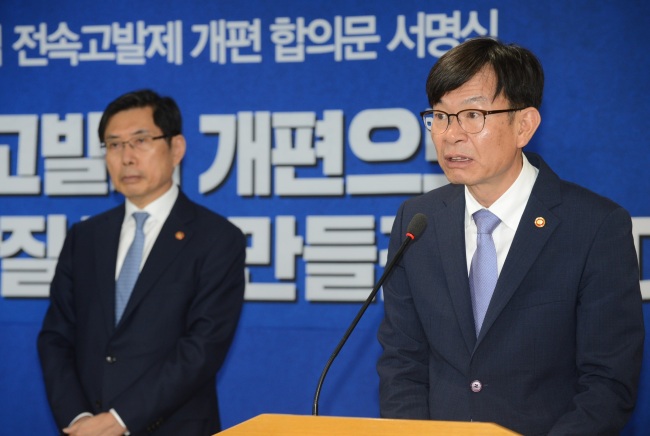South Korean prosecutors will have the authority to charge companies over hardcore cartels without accusations by the Fair Trade Commission, following a mutual agreement between the two organizations to abolish the national antitrust watchdog’s exclusive right to charge businesses, officials said Tuesday.
In the current system, prosecutors can begin an investigation only if there is an official accusation by the FTC in the area of violation of fair trade laws.
However, with growing complaints the antitrust authority has been too lenient in exercising its investigative power, President Moon Jae-in vowed during his election campaign in 2017 to abolish its exclusive right and distribute it to prosecutors.
“For hardcore cartels, the Ministry of Justice and the FTC have reached an agreement that prosecutors can investigate a case without an accusation from the FTC,” said Justice Minister Park Sang-ki during a ceremony Tuesday to sign an agreement on changes in the FTC’s investigative power.
 |
Fair Trade Commission Chairman Kim Sang-jo (right) and Justice Minister Park Sang-ki during a ceremony to sign an agreement on changes in the FTC’s investigative power on Tuesday (FTC) |
Hardcore cartels relate to price-fixing, limiting supply, market segmentation and bid-rigging that may harm fair competition and deprive companies of opportunities to enter a market, according to a joint statement released on the same day.
The FTC had taken flak for not investigating construction companies despite allegations of cartels related to a project to improve the nation’s four major rivers worth 23 trillion won ($20.6 billion) under the Lee Myung-bak administration.
“Prosecutors will actively respond to such cases by swiftly launching investigations for a fair and transparent market in the future,” Park said.
However, the toughening of the investigation of cartels has raised concerns among businesses that investigations may overlap and increase the burden on companies.
“I understand the deep concerns of companies that the abolition of the FTC’s exclusive right may increase the burden on companies. We will closely cooperate with prosecutors in handling cases to reduce such concerns,” FTC chief Kim Sang-jo said at the ceremony.
The FTC said it will continue to be the single channel for leniency, though information on leniency will be shared in real time with prosecutors.
Leniency -- which is regarded as a critical tool to uncover cartels -- is a system that exempts companies from punishment if they voluntarily report collusion. However, if the leniency information is shared with prosecutors, this may put a damper on willingness to report collusion.
“(Given such concerns,) we will make companies that voluntarily report collusion immune from administrative measures and criminal charges,” Kim said.
The latest agreement between the two organizations was reached following four dialogue sessions between the two heads and nine meetings involving working-level officials. The agreement will be included in revised bills related to the complete overhaul of the nation’s fair trade law that will be submitted to the National Assembly this year.
By Shin Ji-hye (
shinjh@heraldcorp.com)








